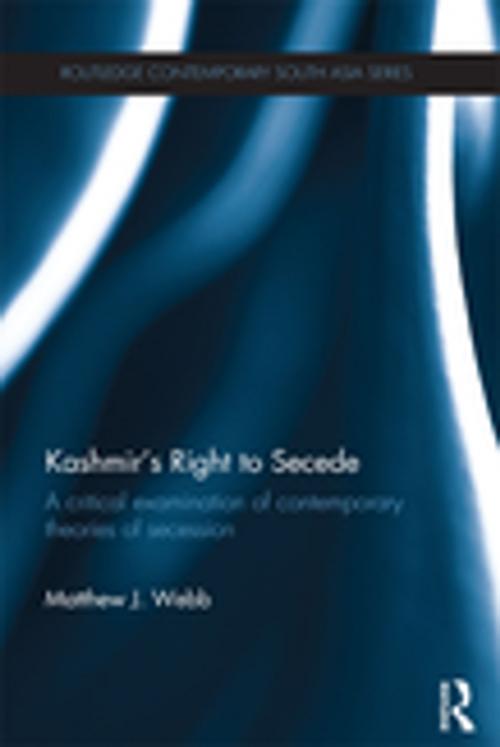Kashmir's Right to Secede
A Critical Examination of Contemporary Theories of Secession
Nonfiction, Social & Cultural Studies, Social Science, Cultural Studies, Ethnic Studies, Political Science| Author: | Matthew J. Webb | ISBN: | 9781136451447 |
| Publisher: | Taylor and Francis | Publication: | February 13, 2012 |
| Imprint: | Routledge | Language: | English |
| Author: | Matthew J. Webb |
| ISBN: | 9781136451447 |
| Publisher: | Taylor and Francis |
| Publication: | February 13, 2012 |
| Imprint: | Routledge |
| Language: | English |
A separatist conflict has been ongoing in India-administered Kashmir since 1989. Focusing on this region, this book critiques the existing normative theories of secession, and offers a comprehensive examination of the right of sub-groups to secede.
The book looks at the different accounts of the moral right to secede, and assesses both the theories themselves as well as the claims of those who want to separate Kashmir from India. Included within this analysis are the three main types of normative theory that ground the right of groups to secede in principles of national self: determination, consensual governance and rectificatory justice. Previous studies have discussed the causes behind the uprising in Kashmir against Indian authority and examined some of the legal and geo-political implications of the conflict for India and the wider region. This book provides a new way of looking at the Kashmir dispute, by asking what these theories tell us about Kashmir, and in turn what the example of Kashmir allows us to learn about these theories. It is of interest to students and scholars of South Asian Politics and International Relations.
A separatist conflict has been ongoing in India-administered Kashmir since 1989. Focusing on this region, this book critiques the existing normative theories of secession, and offers a comprehensive examination of the right of sub-groups to secede.
The book looks at the different accounts of the moral right to secede, and assesses both the theories themselves as well as the claims of those who want to separate Kashmir from India. Included within this analysis are the three main types of normative theory that ground the right of groups to secede in principles of national self: determination, consensual governance and rectificatory justice. Previous studies have discussed the causes behind the uprising in Kashmir against Indian authority and examined some of the legal and geo-political implications of the conflict for India and the wider region. This book provides a new way of looking at the Kashmir dispute, by asking what these theories tell us about Kashmir, and in turn what the example of Kashmir allows us to learn about these theories. It is of interest to students and scholars of South Asian Politics and International Relations.















